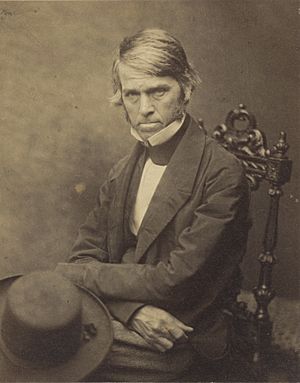The dismal science facts for kids
The dismal science is a nickname for the study of economics. It was first used by a Scottish writer named Thomas Carlyle in 1849. He used the phrase in an essay called Occasional Discourse on the Negro Question. Carlyle used "dismal science" to contrast it with "gay science," which was a term for the art of troubadours (singers and poets from long ago).
Why Was it Called the Dismal Science?
Thomas Carlyle first used the phrase "the dismal science" in his 1849 essay. In this essay, he shared his strong opinions about how society should work. He believed that some people, like those in the West Indies, should be made to work to be productive. He felt that economics, which focused on ideas like "supply and demand" and letting people be free, was "dismal" because it didn't force people to work.
Carlyle also connected the word "dismal" to the ideas of another thinker, Thomas Malthus. Malthus had a theory that the human population would grow faster than the food supply. This would lead to problems like starvation. Carlyle saw this idea as very sad and without hope.
Another famous thinker, John Stuart Mill, disagreed with Carlyle's views. Mill believed that Carlyle's ideas made hard work seem like the only good thing. He also felt that Carlyle unfairly judged people based on their background.
John Ruskin, another writer, was influenced by Carlyle's ideas. Ruskin later wrote his own criticisms of economics.
Beyond Carlyle's Ideas
Over time, many people understood "the dismal science" to mean the sad or gloomy predictions that came from economic theories in the 1800s. For example, the ideas of Thomas Malthus made many people worry. They believed that if poverty was reduced and living standards improved, the population would grow too much. This would then lead to more poverty and even starvation.
Even though these ideas seemed very grim, economists like David Ricardo had more complex views. Ricardo, for instance, did not believe that wages would always fall to the lowest possible level.
Today, the phrase "dismal science" is sometimes used in a similar way. For example, a computer scientist named E. W. Dijkstra once said that if economics is "The Miserable Science," then software engineering should be known as "The Doomed Discipline." This shows how the term is still used to describe fields that deal with difficult or challenging problems.
See also
- An Essay on the Principle of Population – The book by Thomas Malthus about population growth.
- Critique of political economy – Different ways people have criticized economics.
- Illth – A term by John Ruskin meaning the opposite of wealth, like things that cause harm.
- Malthusian growth model – The mathematical idea behind Malthus's theory.
- Malthusianism – The beliefs and ideas that came from Malthus's theory.


